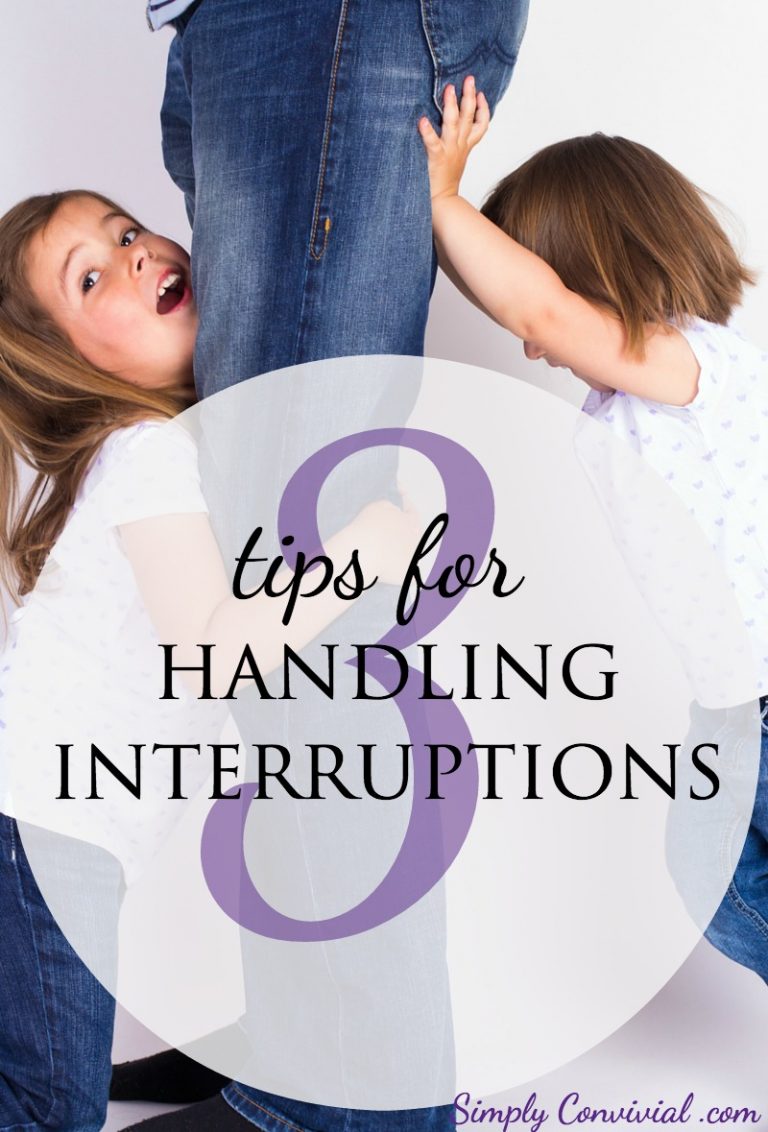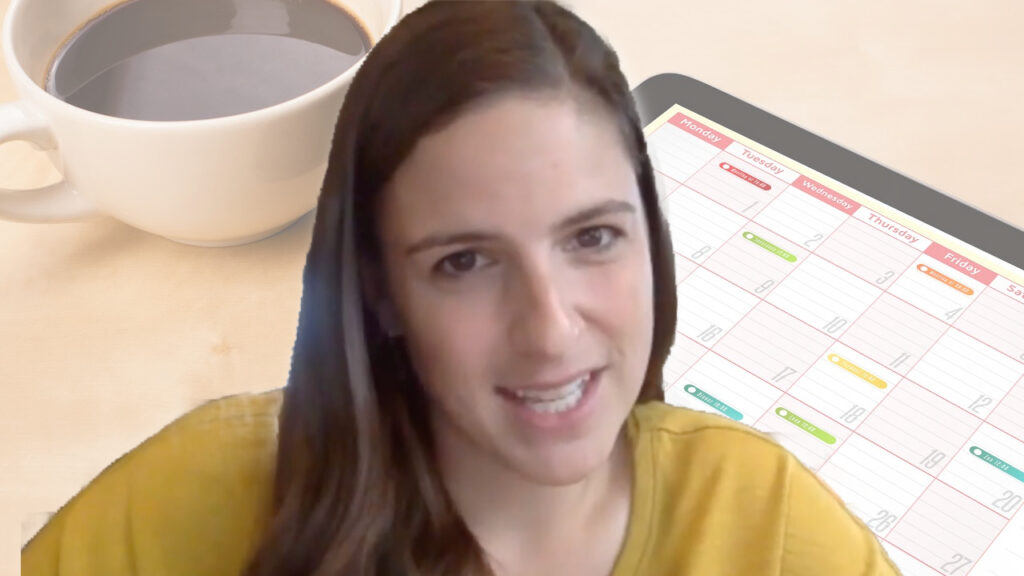Or, how to get anything done as a homeschool mom.
Ah, interruptions, the bane of the homeschool mother’s day and destroyer of her sanity.
We troll through the internet, seeking the secret that will keep our children occupied whenever we want to get things done, that will magically make our children notice when we’re engaged with someone or something else and can’t listen at that moment. We think there must be something someone else is doing that we’re missing.
We look for schedules and plans that will prevent interruptions from laundry piles and clutter piles. Some of us even wonder if unschooling really is the only feasible option because life just seems crazy and out of hand.
That’s why we look for solutions and plans that give us control over all the variety of interruptions that plague us, whether it’s the toddler tugging on our shirt or the incessantly talking preschooler or the preteen who thinks his problems are the only ones that matter or the phone that doesn’t stop ringing or the notifications that constantly buzz or the cruft that spawns in every corner and creeps out whenever our backs are turned.
Maybe you misunderstood the title, though. This post is not about 3 ways to stop interrupting children or interrupting events, but 3 tips for handling the inevitable interruptions – because they are inevitable.
The kind of control we’re supposed to have is not so much over others, however, but over ourselves.
So let’s talk about ways to handle ourselves and our own expectations and reactions during interruptions, because it’s our own responses and attitude that we must prioritize before fixing others.
Handling interruptions: Teach signals.
Now, when it comes to children and their interruptions, we have two issue going on.
First, we have to know we are the parent, we are in charge, and we can set the standards of behavior in our household. We can make a policy against interrupting, and then hold everyone to it. If children are constantly interrupting you at every turn, then it’s possibly a sign they think they are the authority in the home instead of you. That’s a problem, and one way to correct it is to insist they honor you, their mother, by not interrupting your conversation with others or especially your words to them. Sometimes I have to stop the situation unfolding and say, “No, I am talking to you. You may not speak until you are done listening to what I am saying to you.”
Second, we have to know that all policy enforcement must still be done with kindness. We are setting the tone, even while laying down the law and holding the line. Our talk might be seasoned with salt, but it must be fundamentally gracious (Colossians 4:6). Teaching our children polite interaction takes years, not a week, so don’t grow weary in doing good and remember that love is not irritable or resentful.
When we look only at the faults in our children and not our own, we are removing specks while ignoring our own logs. Perhaps God is sending those interruptions so we can see our own heart and deal with it. That doesn’t let our kids off the hook for disobedience or disrespect, but it does affect how we handle it. Our job is to get right ourselves, do the right thing, then bring our children along with us in choosing obedience and putting others before ourselves.
That said, here are some helpful solutions other homeschooling moms have already written about that I think are brilliant:
Don’t Interrupt: A Secret to Peaceful Days by Brandy Vencel at Afterthoughts
With each interruption, minutes are added to the math lesson. Let’s say at least one interruption happens in the middle of some instructions. Now, one of the girls is confused about what to do, and I have to spend even more time straightening her out.
Brandy Vencel, “Don’t Interrupt: The Secret to peaceful days”
Give children a card – Dawn Garrett
We made ‘I Need to Narrate’ cards so kids can let me know when I’m working with a sibling – like math with her brother. I need to laminate them so they can use whiteboard markers to write which book they need to narrate.
Dawn garrett, seen on Instagram
Schooling with Littles :: Naptime School by Celeste Cruz at Joyous Lessons
Celeste arranges her schedule so that she can do what needs to be done when there are no interruptions (sacrificing Quiet Time) and so that when the little interruptors are running around, they aren’t actually interrupting anything – they’re just being themselves and being enjoyed.
And then when my youngest three are settled in their beds and my preschooler takes a book and lies down for her rest time, it’s my chance to sit down with just my two oldest. I can read without raising my voice over a toddler tantrum. I can use both hands (very rare around here!) to draw in my nature journal or pull down the atlas for some mapping. We can have Grand Conversations without being interrupted. We can spread our books or art supplies all over the table without little hands grabbing. We can think. It’s still a calm time in our day.
Celeste Cruz, “schooling with littles“
Our current logistics hack for interruptions
This year I have reserved our kitchen bar as a “tutoring” space. If I am sitting there with something, no one may come up and ask questions. They just have to wait. They have other things they can go do, and they can wait their turn. I prioritize the younger set first and then send them off to play so they don’t need to interrupt the older boys.
The older boys can add a note on their Trello checklists that they need help, so I can see that they’re waiting (I get a notification) and we can work through everything they’ve marked as requiring help – neither of us have to remember what they were going to ask, because they wrote it down instead of interrupting the moment they thought of it.
Ubiquitous capture for the win.
Handling interruptions: Communicate clearly.
When children interrupting is a significant disruption most days instead of an occasion issue and matter of minor reminders, it’s time to ask ourselves some honest questions to get to the root of the matter.
First, it might be a personality thing, and thus something that will take perseverance, patience, and understanding. Some kids are by nature more clueless about what’s going on around them and need help noticing that they’re interrupting. Some kids are by nature more expressive and talkative and speak without thinking (and maybe without stopping). Such personality traits aren’t an excuse for rudeness or disobedience, it doesn’t mean they get a pass on whatever behavior comes naturally (none of us do), but we need to remember our children’s frame as we direct them in the way they should go.
We also need to examine ourselves when we’re dealing with interruptors. Do we listen when they talk? Are they clamoring for attention because they don’t get it frequently or fully enough? Are they able get your attention when they’re polite & mild? Ouch, I know. Me, too.
Do we look them in the eye when they’re talking to us? Do we keep our word when we say “in a minute”?
Do we take the time to teach the habits of politeness and non-interrupting, to teach them the patterns, the logistics, that we’ve settled on? Or do we expect to only tell them once and have it all work smoothly from thence forth? If you’ve been a mom for long, you know that doesn’t work. The problem isn’t (necessarily) with your logistics or with your kids, but with your expectation: habits take time to learn and patient repetition to teach. Accept the process.
Handling interruptions: Organize your attitude.
Of course, I couldn’t not bring up the apt C.S. Lewis quote in a post all about interruptions. He knew this truth, and how much more is it true for mothers:
“The great thing, if one can, is to stop regarding all the unpleasant things as interruptions of one’s ‘own,’ or ‘real’ life. The truth is of course that what one calls the interruptions are precisely one’s real life — the life God is sending one day by day.”
Our kids do need to learn, and it’s our job to teach them – so let’s do our job patiently & cheerfully, remembering that they are our duty, not an interruption to what we’re supposed to be doing.
That means that how we handle them and their interruptions matters more than whether or not they do interrupt. We might never completely solve the logistical issues, but if we handle them with grace and loving firmness, we will be teaching them by modeling a more valuable lesson than the history or science book ever will.
We must not lose sight of the fact that our demeanor with them and our tone and attitude as we roll with the punches is the most meaningful and influential teaching we do.

Get 5 of my favorite homeschool checklist templates!
Jumpstart your homeschool checklist practice by starting with one of my proven formats. Open, edit, and make them your own! Plus, get tips and followup, too –









No pestering necessary … when we actually do some school and use them, I’ll write about it :-/